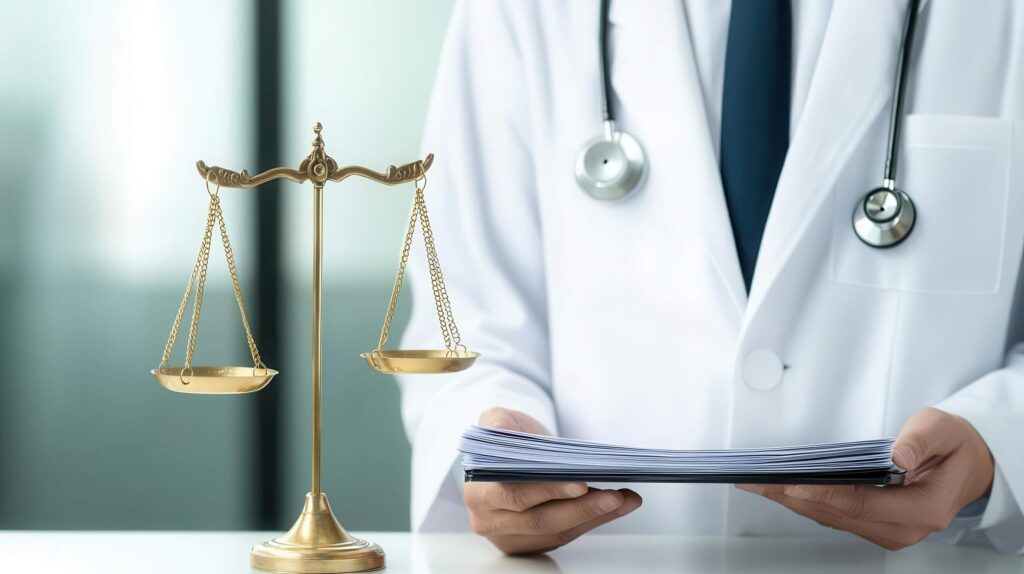A medical malpractice deposition is a critical step in a lawsuit. It requires doctors, expert witnesses, and other medical professionals to provide sworn testimony under questioning from attorneys. Though depositions take place outside the courtroom, they are legally binding, and anything said can be used at trial.
Understanding how to prepare for a deposition can make a significant difference in the outcome of a case. This guide will explain what to expect, how to answer questions, and which legal strategies can help protect your rights.
What Is a Medical Malpractice Deposition?
Purpose of a Deposition
A deposition is a formal legal proceeding where a witness provides testimony under oath before a trial. Attorneys use depositions to gather information, clarify facts, and assess witness credibility.
In medical malpractice cases, depositions help attorneys determine whether a doctor’s actions met the standard of care. The plaintiff’s attorney may try to highlight inconsistencies in testimony, while the defense attorney will work to establish that the medical professional acted appropriately.
How Depositions Work
Depositions take place in a law office or a neutral location and are recorded by a court reporter. Although they occur outside of court, they hold the same legal weight as testimony given at trial. Any statements made can be presented to a jury.
Since depositions play a significant role in medical malpractice litigation, medical professionals must be well-prepared to protect themselves.
Pennsylvania Deposition Rules for Medical Malpractice Cases
Objections and Questioning Limits
Pennsylvania has specific rules governing medical malpractice depositions. Attorneys may object to certain questions, but in most cases, the witness must still answer unless the objection involves privileged information or improper questioning.
While attorneys can ask broad questions to gather information, they cannot ask harassing or irrelevant questions.
Deposition Recording and Court Use
Depositions are recorded, and transcripts are often used in court. Even if a deposition does not seem as formal as a trial, the testimony given can impact the case.
Expert Witness Considerations
Medical professionals serving as expert witnesses face more detailed questioning. Their testimony is often crucial in determining whether malpractice occurred, making preparation even more important.
Understanding these legal guidelines helps doctors and other medical professionals avoid saying something that could be used against them.
How to Prepare for a Deposition as a Medical Professional
Review Case Details with Your Attorney
Before the deposition, meet with your attorney to review all case-related documents, including medical records and patient history. Being familiar with these details ensures that your testimony is accurate and consistent.
Practice Answering Deposition Questions
Lawyers will ask a mix of straightforward and challenging questions. Common questions include:
- What is your medical background and experience?
- What were the patient’s symptoms at the time of treatment?
- What actions did you take, and why?
- Were there any complications or unexpected outcomes?
Practicing responses helps ensure that your answers are clear, factual, and not open to misinterpretation.
Understand Your Legal Rights
You have the right to ask for clarification if a question is unclear. You are not required to guess or speculate. If you do not remember a specific detail, it is better to say, “I do not recall at this time” rather than making assumptions.
You are also allowed to take breaks if needed to collect your thoughts or consult your attorney.
Common Deposition Mistakes and How to Avoid Them
1. Talking Too Much
Providing unnecessary details can lead to additional follow-up questions that complicate your testimony. The best approach is to answer only what is asked and avoid adding extra information.
2. Guessing or Speculating
If you do not remember something, do not guess. Any incorrect statement made during a deposition can later be challenged in court, which could undermine your credibility.
3. Losing Composure Under Pressure
Opposing attorneys may use aggressive questioning tactics to provoke a reaction. Remaining calm, composed, and professional is crucial.
4. Contradicting Previous Statements
If your testimony contradicts prior statements or medical records, it can severely damage your credibility. Reviewing documentation before the deposition ensures consistency in your answers.
5. Being Defensive or Argumentative
Even if a question seems unfair, responding with hostility creates a negative impression. Answer professionally and let your attorney handle objections if needed.
Avoiding these mistakes helps ensure that your testimony remains strong and legally sound.
Legal Strategies for Protecting Your Testimony
1. Pause Before Answering
Taking a moment before responding allows you to think carefully about your words. Rushed answers may lead to misstatements.
2. Stick to the Facts
Avoid offering personal opinions or making assumptions. Providing only clear, factual responses ensures that your testimony is accurate and difficult to challenge.
3. Do Not Try to Outsmart the Opposing Lawyer
Some doctors may feel tempted to argue with attorneys or challenge their logic, but this can backfire. The best approach is to remain neutral and respond only to the questions asked.
4. Stay Within Your Expertise
If an attorney asks a question outside your medical expertise, do not attempt to answer. Instead, say, “That is outside my area of expertise.” Answering beyond your knowledge can lead to problematic testimony.
Your lawyer is there to protect you and guide you. If you are unsure about a question, ask for legal clarification before responding.
Frequently Asked Questions About Medical Malpractice Depositions
How long does a deposition typically last?
The length of a deposition depends on the complexity of the case and the number of questions the attorneys need to ask. Most medical malpractice depositions last several hours, though some can extend to a full day or even multiple sessions. The process is thorough because attorneys on both sides want to gather as much information as possible before going to trial.
Can I refuse to answer certain questions?
In general, you must answer all relevant questions posed by attorneys. However, if a question is inappropriate, harassing, or legally improper, your attorney can object. While objections can be made during a deposition, you may still be required to answer, and the judge may later decide whether the response can be used in court. If a question involves privileged information or is outside the scope of the case, your attorney may intervene to protect you.
Can I take breaks during my deposition?
Yes, you are allowed to take breaks during your deposition. Depositions can be long and mentally exhausting, so if you need a break to collect your thoughts, consult with your attorney, or simply step away for a few moments, you have the right to do so. It is important to remain focused and composed, and taking periodic breaks can help maintain clarity throughout the questioning process.
What if I don’t remember something?
If you do not recall a detail, it is perfectly acceptable to say, “I do not recall” rather than guessing or speculating. Guessing can lead to inconsistencies in your testimony that opposing attorneys may later challenge. If you need to review medical records or documents to refresh your memory, you may request to do so. Honesty and accuracy are more important than trying to provide an answer for every question.
Can my attorney be present during the deposition?
Yes, your attorney should always be present during your deposition. Their role is to protect your legal rights, ensure that you do not answer inappropriate or misleading questions, and provide guidance if needed. Your attorney may object to certain questions, request clarifications, or instruct you on how to respond if the opposing counsel is being overly aggressive. Having legal representation is essential in a medical malpractice deposition.
Contact Purchase, George & Murphey, P.C. Today
Medical malpractice depositions are a crucial part of the litigation process, and proper preparation is essential. By understanding Pennsylvania’s deposition rules, reviewing case details, and practicing response strategies, doctors and medical professionals can navigate depositions with confidence.
If you are facing a medical malpractice deposition, do not go through the process alone. An experienced malpractice defense attorney can help you prepare, anticipate difficult questions, and ensure that your rights are fully protected.
Contact Purchase, George & Murphey, P.C. today to receive expert legal guidance and support.













